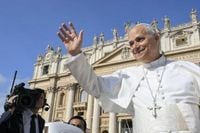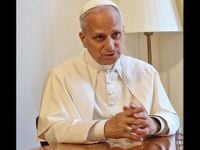On September 18, 2025, the world received an unprecedented glimpse into the mind and mission of Pope Leo XIV, the first American-born pontiff in Catholic history, through the full release of a sweeping three-hour interview with Crux Senior Correspondent Elise Ann Allen. The conversation, which forms the backbone of Allen’s newly published Spanish-language biography, Leo XIV: Citizen of the World, Missionary of the XXI Century, offers candid reflections on some of the most pressing global and ecclesial issues of our time—from the humanitarian crisis in Gaza to the delicate dance between the Vatican and China, and the evolving role of the Catholic Church in a polarized world.
The interview, conducted in two sessions on July 10 and July 30, 2025, and now available in Spanish from Penguin Peru (with English and Portuguese editions expected in early 2026), is already making waves for its forthright tone and the pope’s willingness to address controversy head-on. As Allen notes in her introduction, Leo XIV’s tenure is still young—he celebrated his 70th birthday just days before the interview’s release—but his vision for the church and the world is already taking shape in ways that are both bold and measured.
Perhaps no issue looms larger in the interview than the escalating conflict in Gaza, where 2.1 million Palestinians are enduring what many describe as catastrophic conditions. Pope Leo XIV did not mince words about the gravity of the situation. "Even with some pressure, I don’t know how great it’s been behind the scenes, but even from the United States, which is obviously the most significant third party that can place pressure on Israel," he said, "there has not been a clear response in terms of finding effective ways to alleviate the suffering of the people, the innocent people in Gaza, and that is obviously of great concern." (Crux)
He went on to highlight the mounting use of the term "genocide" to describe the events unfolding in Gaza, noting, "The word genocide is being thrown around more and more. Officially, the Holy See does not believe that we can make any declaration at this time about that. There’s a very technical definition about what genocide might be, but more and more people are raising the issue, including two human rights groups in Israel have made that statement." (Crux) The two organizations he referenced, B’Tselem and Physicians for Human Rights, have both publicly accused Israel of genocide, a charge that has sparked fierce debate within Israel and around the world.
Yet for Leo XIV, the focus is less on legal terminology and more on the urgent need for action and compassion. "It’s just so horrible to see the images that we see on television," he lamented. "Hopefully something will turn this around. Hopefully we won’t grow numb. That’s sort of a human response because you can only stand so much pain, so the numbness is a way of just deadening the nerves and saying, ‘I can’t take anymore’, so it stops. I think certainly human beings, and as a Christian response, we can’t grow numb, and we can’t ignore this. Somehow, we have to continue to push, to try and make a change there." (Crux)
His concern for Gaza is not confined to words. According to reports, Leo XIV has spoken out several times on the crisis since becoming pope, including at his public audience on September 17, 2025. He has also maintained direct contact with Rev. Gabriel Romanelli, the parish priest of the Holy Family Catholic compound in Gaza, where clergy and hundreds of civilians have chosen to remain despite Israeli orders to evacuate. (America Magazine)
Turning to another complex arena, Pope Leo XIV addressed the Vatican’s relationship with China—a subject that has vexed popes for generations. When asked about his approach, he was characteristically candid: "I would say that in the short term, I will continue the policy that the Holy See has followed for some years now, and it’s been several predecessors. I in no way pretend to be wiser or more experienced than all those who have come before me. I’m also in ongoing dialogue with a number of people, Chinese, on both sides of some of the issues that are there." (Crux)
His comments reflect a pragmatic continuity with the Vatican’s recent diplomatic efforts, including the 2018 Provisional Agreement on the nomination of bishops—a deal first brokered under Pope Francis that sought to bridge the divide between the official and unofficial Catholic communities in China. With some 12 million Catholics in mainland China, roughly half of whom worship outside state-sanctioned structures, the stakes are high. Leo XIV emphasized the need to respect both culture and political realities while supporting Chinese Catholics who have faced "oppression or difficulty in living their faith freely, and without choosing sides." (America Magazine)
"It’s a very difficult situation. In the long term, I don’t pretend to say this is what I will and will not do, but after two months, I’ve already begun having discussions at several levels on that topic," he revealed. Notably, Leo XIV is the first pope ever to have visited China, having traveled there during his tenure as prior general of the Augustinians. This unique experience, he suggested, gives him a more nuanced understanding of the challenges and opportunities facing the church in China.
Beyond these global flashpoints, the interview also delved into Leo XIV’s vision for church governance and his personal approach to leadership. He spoke openly about the challenges of being a "world leader," admitting, "There’s still a huge learning curve ahead of me." While he finds the "pastoral part" of the papal ministry relatively easy, he said, "I don’t see my primary role as trying to be the solver of the world’s problems. I don’t see my role as that at all, really, although I think that the church has a voice, a message that needs to continue to be preached, to be spoken and spoken loudly." (America Magazine)
Leo XIV also addressed the significance of being the first pope from the United States, suggesting that his nationality might help improve relationships with U.S. bishops and allow him to raise "Gospel issues" without becoming entangled in partisan politics. "The fact that I am American means, among other things, people can’t say, like they did about Francis, ‘he doesn’t understand the United States, he just doesn’t see what’s going on’. I think that’s significant in this case. I don’t plan to get involved in partisan politics. That’s not what the Church is about. But I’m not afraid to raise issues that I think are real Gospel issues, that hopefully people on both sides of the aisle, as we say, will be able to listen to." (Crux)
He acknowledged that he has not yet met President Donald Trump, though he would be open to engagement on matters of peace and human dignity. "If or when there were specific issues that, if it were possible to engage with him, I would have no problem doing so. I think there are others who are doing that role fine, and he makes his choices, who he listens to and who he doesn’t listen to. But to continue to raise some of the issues, especially about questions of human dignity, of promoting peace in the world, which he at times has made clear he wants to do, in those efforts I would want to support him." (Crux)
Reflecting on the broader challenges facing the church, Leo XIV stressed the importance of unity and peace, both within the Catholic community and the world at large. "I’m trying not to continue to polarize or promote polarization in the church," he said. "A leader who’s walking by himself isn’t leading anyone, but if a leader is capable of bringing people together with himself or herself and moving forward, I think that’s a lot more effective." (America Magazine)
As the Catholic Church embarks on a new chapter under Leo XIV’s leadership, his words offer a window into a papacy that is at once rooted in tradition and responsive to the complexities of the modern world. Whether addressing humanitarian crises, navigating international diplomacy, or striving for ecclesial unity, Leo XIV appears determined to keep the church’s voice clear, compassionate, and engaged.


